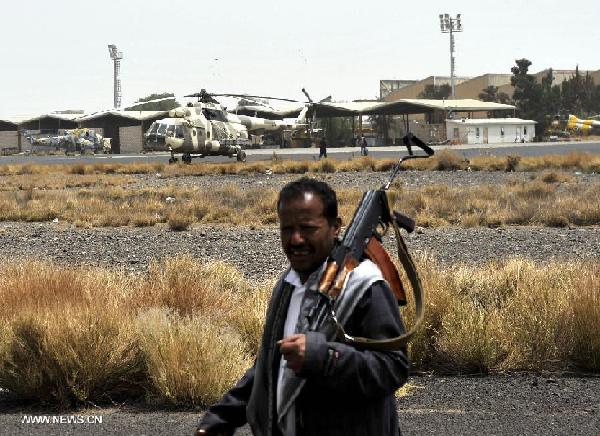Chaos in Yemen and Saudi intervention
- By Sajjad Malik
 0 Comment(s)
0 Comment(s) Print
Print E-mail China.org.cn, March 30, 2015
E-mail China.org.cn, March 30, 2015
|
|
|
An armed man stands guard at Sanaa international airport, in Sanaa, Yemen, March 28, 2015. Earlier on Thursday, a Saudi-led Arab coalition launched airstrikes against Houthi targets in Yemen, including Sanaa international airport. Officials at the airport said on Saturday that the runway has been repaired, but the airport still remains closed. [Xinhua/Hani Ali] |
Yemen has been in turmoil since 2011 when flames of the Arab Spring hit the country. The uprising expelled President Ali Abdullah Saleh who had ruled the country for more than three decades and was grooming his son Ahmed Saleh to succeed in a pattern long adopted by other regional authoritarian rulers.
Saleh's vice president, Abd Rabbuh Mansur Hadi, was elected as the country's new leader in 2012, but failed to fix its many problems, increasing discontent and hastening the precipitous fall into a political abyss.
The Shiite Houthis exploited the situation and their armed rebels captured the capital Sana'a last September. Expanding their rule with the alleged connivance of Iran, they forced President Hadi to flee, first from the capital and from the country. According to the latest information, Mr. Hadi attended an Arab League regional conference in Egypt with the vague hope of being restored to power through the military efforts of a Saudi-led alliance.
Yemen, which is the ancestral land of former Al-Qaeda chief Osama bi Laden, has ceased to function as a country. Its airports have been closed and major Western embassies shut. The latter is due not only to the poor security situation but also the fact that there is no legitimate central authority with which the international community could deal.
On paper, Hadi is still the "legitimate" president, but a leader who ran away under the protection of Saudi Arabia can hardly be considered ruler of a country where rebel militias control the major cities.
In its present condition, Yemen is ostensibly no better off than Somalia, Libya or Syria and, indeed, may be worse.
Yemen is home of Al-Qaeda in the Arab Peninsula (AQAP) and its security forces were previously fighting tough battles with the Islam militants. The Sunni-Shiite divide in Yemen is even sharper than many other places. With the Houthis having taken over the country, the perceived threat to the most powerful neighbor Saudi Arabia multiplied. The Islamic State (ISIS) has also joined in, with attacks against Shiite mosques.







Go to Forum >>0 Comment(s)